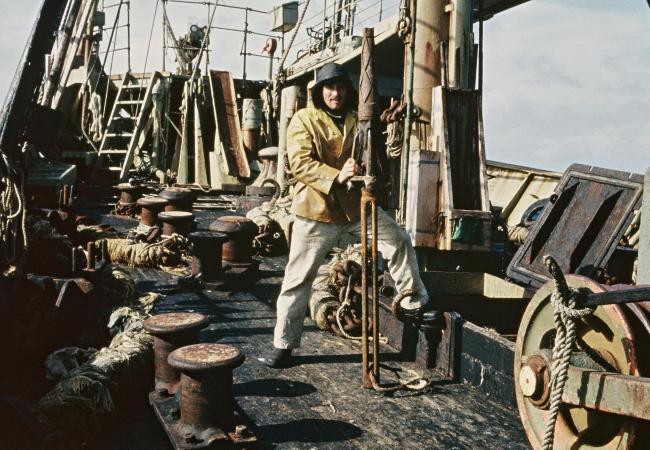Two years’ hard work culminates at Leith Dockers’ Club this afternoon. Citadel Arts Group have been spending time with the few remaining members of Christian Salvesen‘s whaling fleet, collating their memories and recording this formative part of Leith’s history for posterity. A first play based on these stories, Jim Brown’s Whit Aboot The Wimmen? premiered at last year’s Leith Festival; a book, Whaling Days, was launched on a snowy day back in January; and now, this second play, also by Jim Brown, has been created from the overspill of memories shared by the sailors.
Malky takes us on a whirlwind journey to the Antarctic with the titular teenager. We’re there and back in under half an hour, but for the young man it’s been a coming-of-age. At age 14, he’s meant to be finishing off at school, but his war widow mother needs him out on the fleet and earning his keep. Taken by his ex-whaler grandad to Salvesen’s office, he’s given a one-way ticket to Liverpool, where he’ll join one of the final fleets heading to the other Leith in South Georgia. On the way, he’s taken under the wing of old hand Jake, who steers him clear of grumpy colleague By-the-way Bob.
Scenes rattle by and there isn’t really time for character or plot development, let alone twists or suspense. The play’s been put together as a more age-appropriate alternative to Whit Aboot The Wimmen? to show schoolkids part of their local history. Fact-sharing therefore plays a big part in every scene and there’s much singing of silly sea-songs. Sound effects (Stewart Emm) are wonderful and delivered bang on cue to aid with the atmosphere.
Acting, under the direction of Mark Kydd, is also first-rate for such a small, local event. Lewis Gribben has good presence and crisp delivery as young Malky, and both Deborah Whyte and Alan Ireby prove their versatility in a variety of roles. It’s a shame there isn’t more of a dramatic story arc for them to get their teeth into, but given the factual ground that needs covering, the lack of it’s understandable. This is a reconstruction of many people’s memories. Making sure they’re pieced together and preserved is the main thing.
The real treat is saved ’til the end when some of the old boys themselves gather down the front to answer questions and tell more stories. Another ex-whaler’s grandson kindly shares his grandad’s memorabilia, including scrimshawed whales’ teeth and an MBE. Whaling’s now over, of course, and all agree that’s a good thing. But they’re proud of their history, the work they put in and the friendships they made. The way they vividly recall tales from seventy years ago is testament to the power of the experience. It’s a hardship, a camaraderie and a face-to-face confrontation with brutal nature that few of younger generations will know.
